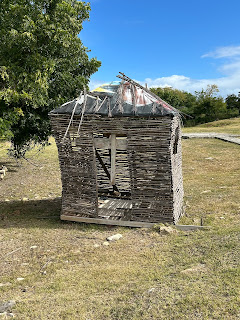I've had enough of Admiral Horatio Nelson, naval man extraordinaire. But Dan has promised Theo we will see more. Leaving Shirley Heights, we journey down to where the harbor sits, to the town that was built to provide for the needs of the military that were stationed there.
Today, the town's been revitalized to serve a more modern purpose--stores for shopping and restaurants for eating. But, if you can ignore the hustling and bustling tourists, you can glimpse a world that existed 200 years ago. And, maybe, see some fish.
"Imagine," Dan says to Theo, "that you were a cat 200 years ago. No cat food from cans. No such thing as Fancy Feast or Science Diet."
Theo frowns. He doesn't like imagining that scenario.
"But there would have been a lot of fish," I reassure him.
Theo loves fish--any kind of fish (tuna, scallops, shrimp, white fish), and so he becomes an enthusiastic participant. The tour begins with a stop at a small two story building with light blue shutters. It is on the way to the water, where the fish and boats are. I'm excited. I like boats. Theo, of course, likes fish.
"This store sells fish," I announce.
Theo thinks I mean real fish, the kind you can eat. So he is raring to go inside and feast. Unfortunately for him, the fish inside this store are beautifully carved wooden fish, like the ones attached to the front of the building.
Strike One--but still undeterred, Theo marches on.
We pass a brick building, which in years past housed the master shipwright, the guy who made all the repairs to the ships in the harbor. He was a highly skilled laborer.
Theo asks, "Are there any fish inside?"
Strike Two--and Theo cat walks a little slower.
We pass the Joiner's Loft and Boathouse--which both housed the joiners and gave them a place to work.
Dan explains, "A joiner is like a carpenter, but a carpenter builds things out of wood and a joiner's main job is to connect wooden pieces without using fasteners, nails, screws or glue. They seamlessly join pieces together using the groove cuts they make. Nowadays," he adds, "a joiner is like a framer."
Theo listens, squinches up his face, and says only one word, "Fish." Sadly I shake my head. "Not yet. But soon."
We then move to a beautiful white clapboard house with light blue shutters. Two stories. This is where the naval captain lived with his clerk. It was one of the last homes to be built here in town.
We come to the Copper and Lumber Store, a massive warehouse building with three foot thick walls, which stored copper sheets used to cover vessel hulls. An inner courtyard is open and provides ventilation to the wood stored. The seamen who worked there slept in the upper story in hammocks. Before Theo has a chance to ask, I tell him, "No fish."
The problem is you can smell the salt water and fish. Even I can smell it. Theo is sniffing the air, gazing in the direction of the harbor.
I whisper to Dan, "Keep an eye on him. He smells the fish. I think he's going to make a run for it."
Finally, we are standing in front of the Officer's Quarters, where Royal Naval Officers who were waiting for repairs to their ships were housed. Interestingly, on the ground floor, there were twelve large cisterns holding a total of 240,000 gallons of water, which was collected from the roof.
Theo doesn't care. If the cisterns held fish, that might be a different story. But water? He can hardly keep his attention on the building in front of him.
We try to distract him by pointing out the cannon that is sitting a few feet in front of us.
We turn to head back, but Theo refuses to move.
"What do you think--I can conjure up fish with a magic spell?"
When Theo wants something, he can let loose the most plaintive, sorrowful cry. It breaks your heart and compels you to do the impossible.
"All right. We'll see what we can do."
He doesn't move.
"We'll go down to the harbor right now," Dan says.
Theo's ears perk up, and then he follows his nose. We have to half run to keep up with him.
"We're in big trouble," Dan says. "He's going to be expecting fish."
Let's just say I'm smarter than the average bear. I smile.
We reach the harbor area and Theo has stopped. We catch up to him.
For once I'm prepared. I pull out a can of tuna with one of those pull off tops.
"Wow. I'm impressed," Dan says. "You outdid yourself this time."
"Yeah, I figured tuna might come in handy. Or we'd be stuck down at the pier fishing."
Anything for the gangster cat!
























































